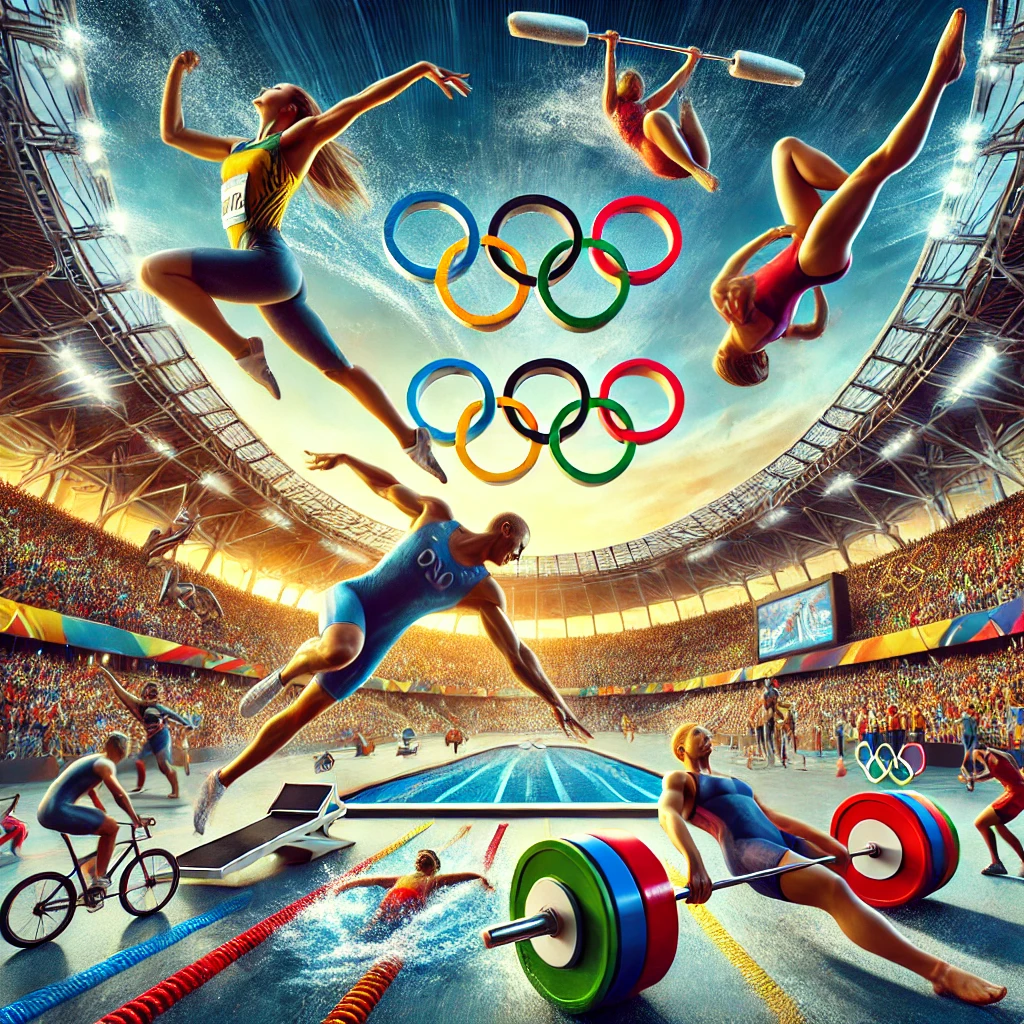
The Olympic Games are the world’s biggest and most celebrated sporting event. They bring together athletes from different countries to compete in a spirit of unity and excellence. But how did the Olympics start? Let’s take a journey through time to explore the history of these iconic games.

Ancient Olympic Games (776 BC – 393 AD)
The origins of the Olympic Games go back to ancient Greece. The first recorded Olympics took place in 776 BC in Olympia, a sacred site dedicated to the Greek god Zeus. The games were held every four years, a tradition that continues to this day.

Only free Greek men were allowed to compete. Women were not even allowed to watch! The early games included simple but intense sports like running, wrestling, boxing, chariot racing, and long jump. The athletes competed naked, as the Greeks believed this honored the gods and showcased the human body’s strength.

The ancient Olympics were not just about sports. They were part of a religious festival, featuring sacrifices and prayers to Zeus. Wars between Greek city-states would even stop during the Olympics to allow safe travel for athletes and spectators.

For over 1,000 years, the games continued, growing in popularity. However, in 393 AD, Roman Emperor Theodosius I banned them, seeing them as a pagan practice. This marked the end of the ancient Olympic Games.

The Revival of the Olympics (19th Century)
After more than 1,500 years, a Frenchman named Pierre de Coubertin decided to revive the Olympic Games. He believed that sports could help build peace and understanding between nations.

In 1896, the first modern Olympic Games were held in Athens, Greece, to honor the ancient tradition. Only 14 countries and 241 athletes participated, but it was a major success. The event featured sports like track and field, gymnastics, wrestling, and weightlifting.

The Growth of the Olympic Games
After the successful revival, the Olympics began to grow. More countries joined, and new sports were added.
- 1900 – Women were allowed to compete for the first time.
- 1924 – The Winter Olympics were introduced, focusing on sports like skiing and ice hockey.
- 1936 – The first Olympic torch relay was held in Berlin, Germany.
- 1960 – The first televised Olympics allowed millions to watch from their homes.

Despite facing challenges like World War I and II, which led to the cancellation of some games, the Olympics continued to expand and evolve.

The Olympics in the Modern Era
Today, the Olympic Games are a massive global event, watched by billions of people. The event is now divided into two main editions: the Summer Olympics and the Winter Olympics, held every four years in different host cities.

Over 200 countries participate, and new sports are regularly added. Recent Olympics have seen the introduction of exciting events like skateboarding, surfing, and sport climbing.

The Olympic Symbols and Traditions
Several traditions make the Olympics special:
- The Olympic Rings – Represent the five continents of the world coming together.
- The Olympic Torch Relay – A flame is lit in Olympia, Greece, and carried to the host city.
- The Opening Ceremony – A spectacular event showcasing the host nation’s culture.
- The Olympic Motto – “Citius, Altius, Fortius” (Faster, Higher, Stronger).

Challenges and Controversies
The Olympics have faced challenges, including political conflicts, doping scandals, and financial concerns. Some games have seen boycotts by countries, while others have struggled with high costs and security issues.

Despite these difficulties, the Olympic spirit remains strong. The event continues to inspire athletes and audiences worldwide, promoting peace, unity, and excellence.

From its ancient Greek origins to the modern-day global spectacle, the Olympic Games have come a long way. They have survived wars, political tensions, and economic struggles to remain the greatest sporting event in history.

The Olympics are more than just sports; they are a celebration of human achievement, determination, and international friendship. As they continue to evolve, they will keep inspiring generations to dream big and aim higher.

The next time you watch the Olympics, remember – you are witnessing a tradition that began over 2,700 years ago. And it’s still going strong!



01oj11
1vn4f3
I wanted to thank you for this great read!! I definitely enjoying every little bit of it I have you bookmarked to check out new stuff you post…
I’d should verify with you here. Which isn’t one thing I often do! I take pleasure in studying a post that can make individuals think. Additionally, thanks for permitting me to remark!
Fantastic website you have here but I was curious if you knew of any message boards that cover the same topics discussed in this article? I’d really love to be a part of community where I can get comments from other knowledgeable people that share the same interest. If you have any recommendations, please let me know. Appreciate it!
Some genuinely fantastic information, Glad I observed this. “Someone’s boring me. I think it’s me.” by Dylan Thomas.
xn88 app com Tính riêng trong năm 2024, nền tảng này đã xử lý hơn 120 triệu lượt cược/tháng, trải dài trên các phân khúc như thể thao, casino live, slots và xổ số.
I happen to be commenting to let you know what a beneficial encounter my cousin’s girl enjoyed reading your web site. She came to find some details, not to mention how it is like to possess a marvelous helping heart to get most people without difficulty understand a variety of tortuous things. You truly did more than my desires. Many thanks for offering those useful, trustworthy, informative and in addition fun tips on the topic to Kate.
Does your site have a contact page? I’m having trouble locating it but, I’d like to shoot you an e-mail. I’ve got some ideas for your blog you might be interested in hearing. Either way, great site and I look forward to seeing it grow over time.
slot365 ios Một trong những ưu điểm lớn nhất của nền tảng là giao dịch tiện lợi. Nhà cái luôn ưu tiên tạo điều kiện tốt nhất để có thể thực hiện các giao dịch một cách dễ dàng và nhanh chóng, đảm bảo sự thoải mái trải nghiệm mượt mà khi tham gia cá cược trực tuyến.
excellent post.Ne’er knew this, thankyou for letting me know.
188v vom Bạn có thể thoải mái lựa chọn vật phẩm và vũ khí đa dạng để tiêu diệt con mồi hiện ra trên màn hình. Chưa dừng lại ở đó, với hơn 50+ boss khủng sẽ giúp ngư thủ mang về phần thưởng cực lớn với giá trị Jackpot hàng tỷ đồng.
188v vom Bạn có thể thoải mái lựa chọn vật phẩm và vũ khí đa dạng để tiêu diệt con mồi hiện ra trên màn hình. Chưa dừng lại ở đó, với hơn 50+ boss khủng sẽ giúp ngư thủ mang về phần thưởng cực lớn với giá trị Jackpot hàng tỷ đồng.
Thank you for your sharing. I am worried that I lack creative ideas. It is your article that makes me full of hope. Thank you. But, I have a question, can you help me?
Hệ thống thanh toán của 188v me được tích hợp các công nghệ bảo mật hiện đại, đảm bảo rằng mọi giao dịch đều được mã hóa bảo vệ an toàn. Điều này giúp người chơi yên tâm thực hiện giao dịch mà không lo lắng về việc thông tin cá nhân hay tài khoản bị xâm nhập. Với hệ thống thanh toán nhanh chóng, an toàn và tiện lợi, nhà cái đã xây dựng lòng tin cùng sự hài lòng tuyệt đối từ cộng đồng người dùng.
roletai
References:
http://www.pshunv.com/space-uid-132866.html
Tham gia slot365 đăng nhập là một quá trình đơn giản, nhanh chóng và bảo mật. Với giao diện được thiết kế tối ưu cho người dùng Việt Nam, việc bắt đầu trải nghiệm nhà cái đổi thưởng trở nên dễ dàng ngay cả với những người mới làm quen với thế giới giải trí trực tuyến.
Your article helped me a lot, is there any more related content? Thanks!
best online shooter
References:
https://stayzada.com/bbs/board.php?bo_table=free&wr_id=487851
Bạn có bao giờ thắc mắc về khả năng ứng dụng công nghệ blockchain để tăng cường tính minh bạch cho các thuật toán RNG? Đây chính là hướng phát triển đăng ký 188v đang nghiên cứu để nâng cao trải nghiệm người dùng trong tương lai.
pci express slot
References:
https://www.google.co.bw/url?q=https://squareblogs.net/wishstart55/cucina-regina
casino new york
References:
http://www.xsmoli.com/home.php?mod=space&uid=969247
monticello casino
References:
https://xs.xylvip.com/home.php?mod=space&uid=4099015
paddy power casino
References:
http://gm6699.com/home.php?mod=space&uid=4107070
american roulette
References:
https://livebookmark.stream/story.php?title=best-online-casinos-australia-traffic-plus-rates-real
I’m truly enjoying the design and layout of your site. It’s a very easy on the eyes which makes it much more pleasant for me to come here and visit more often. Did you hire out a designer to create your theme? Great work!
how do you play jacks
References:
https://clearcreek.a2hosted.com/index.php?action=profile;area=forumprofile;u=1508324
casino games for ipad
References:
https://freebookmarkstore.win/story.php?title=007-KAZINO-ROYAL-2006-full-cast-crew
hard rock casino tampa fl
References:
https://www.google.co.uz/url?q=https://www.woorips.vic.edu.au/profile/niebuhrvellundgreen56849/profile
casinos by state
References:
http://demo.emshost.com/space-uid-4167749.html
online casino list
References:
https://www.google.ki/url?q=https://pad.stuve.de/s/QWtr7NKjjak
casino online malaysia
References:
http://www.kaseisyoji.com/home.php?mod=space&uid=3696411
chef de cuisine
References:
https://www.mixcloud.com/gamelake23/
the colosseum at caesars windsor
References:
https://www.google.pl/url?q=https://www.instapaper.com/p/17227887
argosy casino
References:
http://bbs.lingshangkaihua.com/home.php?mod=space&uid=4154892
mobile casino
References:
https://king-wifi.win/wiki/AUSTRAC_orders_compliance_audits_at_two_casinos
days inn clifton hill casino
References:
https://pad.stuve.de/s/QWtr7NKjjak
Yeah bookmaking this wasn’t a high risk conclusion great post! .
Hey there! I know this is kinda off topic however , I’d figured I’d ask. Would you be interested in exchanging links or maybe guest authoring a blog post or vice-versa? My blog discusses a lot of the same topics as yours and I think we could greatly benefit from each other. If you happen to be interested feel free to shoot me an email. I look forward to hearing from you! Great blog by the way!
Your place is valueble for me. Thanks!…
I’d have to examine with you here. Which is not one thing I usually do! I take pleasure in reading a post that may make folks think. Additionally, thanks for permitting me to comment!
Its excellent as your other blog posts : D, thankyou for putting up. “A gift in season is a double favor to the needy.” by Publilius Syrus.
Your home is valueble for me. Thanks!…
Your point of view caught my eye and was very interesting. Thanks. I have a question for you.
I believe this site contains some really wonderful information for everyone. “A sense of share is not a bad moral compass.” by Colin.
You are my intake, I own few web logs and infrequently run out from post :). “To die for a religion is easier than to live it absolutely.” by Jorge Luis Borges.